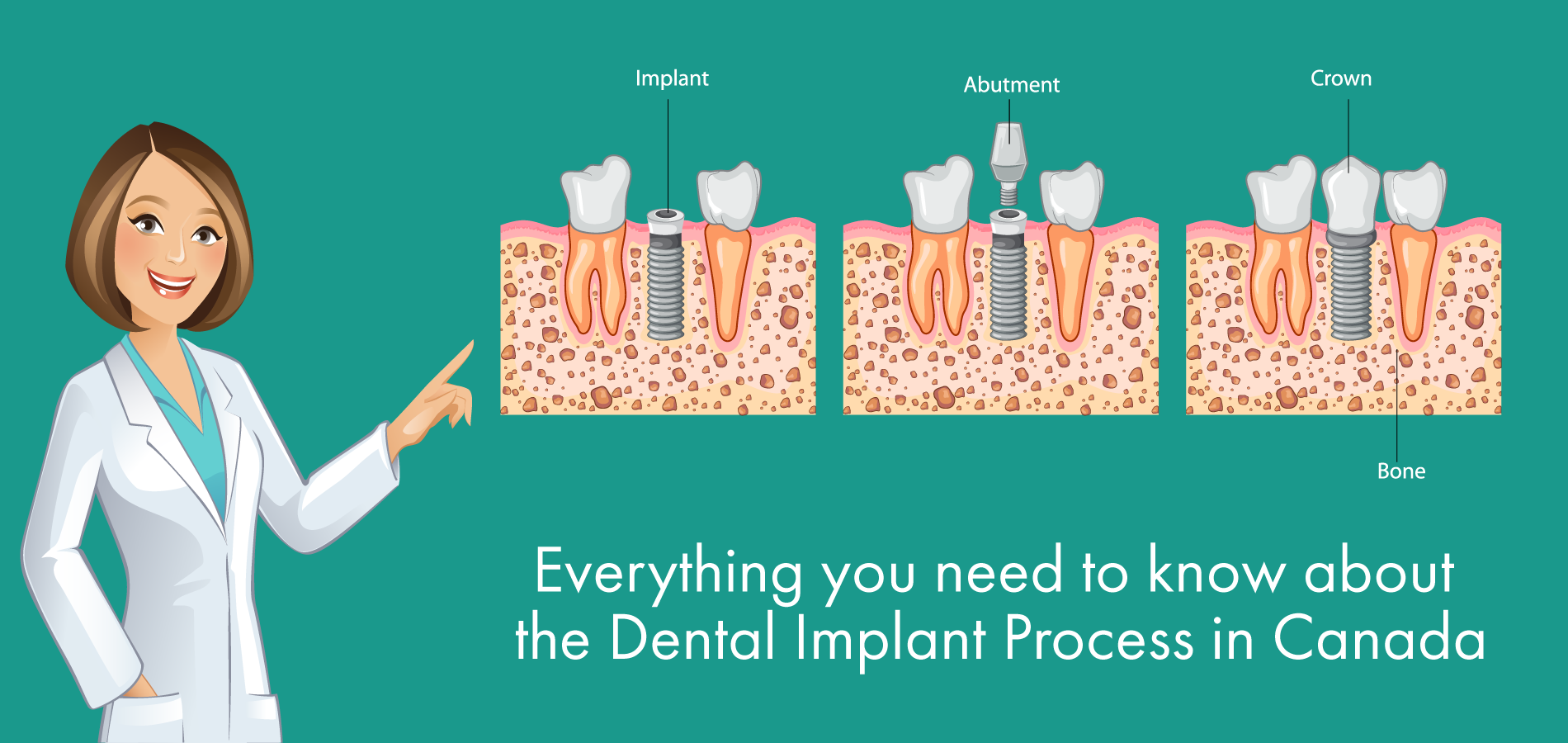When teeth are extracted, there are several options typically available to patients. Be it dentures, bridges, or dental implants with crowns, each option has its pros and cons. In this article, we take an in-depth look at dental implants to help you learn everything you need to know when considering this option.
NOTE: Please consult with a trusted medical professional before making a final decision.
Table of Contents
Click to be directed to a section:
1. What are dental implants?
2. What leads to needing dental implants?
3. Who performs dental implants?
4. Who can get dental implants?
5. How do you know if you're eligible for dental implants?
6. What are the types of dental implants?
7. Dental Implants vs. Dental Bridges
8. Can you get dental implants if you have gum disease?
9. Can you get dental implants if you have bone loss?
10. What is the dental implant procedure like?
11. What happens after the procedure?
12. What complications can dental implants have?
13. How to prevent a dental implant infection
14. How much do dental implants cost?
15. How can I fund my dental implants?
1. What are dental implants?
According to the CDA a dental implant is: "An artificial root made of titanium metal. It is inserted into the jawbone to replace the root of the natural tooth. An artificial replacement tooth is attached to the implant. The implant acts as an anchor to hold the replacement tooth in place."
Because dental implants fuse to your jawbone, they are able to provide stable support for artificial teeth. Dentures or bridges can be mounted on dental implants, or, more commonly, a single crown is placed over the implant.
Each implant has 3 parts:
- A crown (the ceramic material that looks like a tooth)
- The abutment (this attaches the crown to the screw)
- A screw (this enters the root and bonds to the jaw bone)
2. What leads to needing dental implants?
Dental implants are used to replace missing teeth. Your teeth could be missing for a variety of reasons, including decay or trauma.
3. Who performs dental implants?
Dental implants are typically performed by an oral surgeon who specializes in placing implants. Specialists who place the crown on an implant are called prosthodontists.
4. Who can get dental implants?
You can get dental implants, typically, if you are in good general health. This includes having healthy gums and enough bone in your jaw to hold the implant. In some cases, patients who do not have enough bone in their jaw are able to have a bone graft to build up the bone.
5. How do you know if you're eligible for dental implants?
Typically, you would need to have a jawbone that's reached full growth, adequate bone to secure the implant, or the ability to have a bone graft. However, whether you're eligible or not for dental implants is determined on a case by case basis. Each patient will have variations in their health, jaw structure, bone density, and so on
Your best option is to consult with a professional.
6. What are the types of dental implants?
There are three main types of dental implants patients can choose from, based on their individual needs:
- Endosteal: This is the most common implant type. It is suitable for most patients and requires a healthy jawbone.
- Subperiosteal: This type of implant is not fused to the jawbone, and instead rests on top under the gum.
- Zygomatic: This type of implant is placed in the cheekbone (this is the bone below the eye) instead of the jawbone.
7. Dental Implants vs. Dental Bridges
- Dental implants can be used to replace a single missing tooth, dental bridges replace consecutive missing teeth. Typically, a dental bridge is held in place using adjacent teeth. If anything happens to those teeth, the bridge will need to be removed.
- In some cases, a bridge may be required as well as a dental implant.
- Bridges can last 5-10 years, dental implants can last a lifetime. The 30 year survival rate of a dental implant is over 90%.
- Both dental implants and dental bridges, done correctly, should protect the integrity of the surrounding teeth.
- Dental implants typically look more natural than other options.
8. Can you get dental implants if you have gum disease?
If there is any evidence of gum disease, it will need to be treated before moving forward with a dental implant. An important requirement for a dental implant is the health of the seal between the implant and your gums. Gum disease can affect the cost of the dental implant.
9. Can you get dental implants if you have bone loss?
In order to hold a dental implant in place high bone density is required. If you have significant bone loss, a bone graft will likely be required. This is another factor which can affect overall costs and time for the procedure.
10. What is the dental implant procedure like?
Dental implants have several steps and take several appointments to complete:
- Diagnosis: The oral professional will examine your mouth via imaging technology and determine if an implant, or implants, are the right option for you.
- Pre-Operation: Before the operation patients are typically sedated.
- Stage One of Operation: Gum tissue above the jawbone is opened and a small hole is drilled in your jawbone. This hole is for the screw to be placed in. After the screw is placed, the gum tissue is stitched back into place. You now will need to wait up to several months for the tissue to heal, and for the implant to bond to the bone and gums.
- Stage Two of Operation: Next, an abutment is attached to the implant. This is the attachment post for the replacement tooth. If possible, this step may be combined with stage one.
- Attaching Replacement Tooth: Next, a replacement tooth is attached to the abutment. This is done by using special dental cement and a small screw. This can take several appointments to complete.
- Bridge (if required): If multiple teeth are missing, a bridge may need to be created between the dental implants.
11. What happens after the procedure?
A dental implant will require care like natural teeth.
As an important note, most professionals will advise smokers to quit before the procedure as well as after to reduce the likelihood of bonding issues between the screw and jawbone. Smoking can also slow down healing. As well, people who take immunosuppressants may experience higher rates of implant failure.
Checkups will be scheduled throughout the following year to ensure your implants are working properly.
12. What complications can dental implants have?
According to the CDA, these complications are rare, but possible: bleeding, infection, numbness or injury to nearby muscles or the sinus cavity, and failure due to implant not bonding to the bone.
13. How to prevent a dental implant infection
Continue to brush your teeth twice a day (morning and night) and floss regularly. This is important for gum and bone health. As well, watch your sugar intake and drink lots of water.
As always, consult your specialist or dentist to ensure your habits will help keep your implant infection free.
14. How much do dental implants cost?
In Canada, a single dental implant can cost between $1000-$6000. A full mouth of reconstructive implants can cost up to $96,000.
The costs of dental implants will depend on:
- The type of implantation
- The professional who performs the surgery
- The location of surgery
- Implant materials used
- Dental insurance or health plans
For more information about standard pricing on common dental practices, you can visit the 2019 Alberta Dental Guide for Dental Fees. This pricing guide refers specifically to Alberta, but may share similarities with other parts of Canada and the US.
Related Reading: Do I Need Private Health and Dental Insurance in Canada? [The Truth for Small Business Owners]
15. How can I fund my dental implants?
Small business owners in Canada can take advantage of a Health Spending Account (HSA) to turn dental implant costs into a pre-tax expense through their corporation. This can equate to more than 50% in savings. Health Spending Accounts are also eligible for regular dental checkups and many other eligible health-related expenses (licensed massage therapy, physiotherapy, prescription glasses, prescriptions drugs, etc.)
If you are NOT a small business owner, you can file these costs under the Medical Expense Tax Credit (METC). It is a non-refundable tax credit applied through your personal tax return.
Determine your personal tax savings through our METC calculator.
Learn more about tax-free health & dental benefits through a Health Spending Account:

Sources:
https://www.ballarddentalarts.com/blog/top-5-reasons-to-choose-dental-implants/
https://barriedentist.ca/dental-implants/dental-implant-cost/
https://www.medicaltourismco.com/how-much-are-dental-implants-in-canada/
Related Reading:
What Is the Cost of Dental Implants in Canada?






